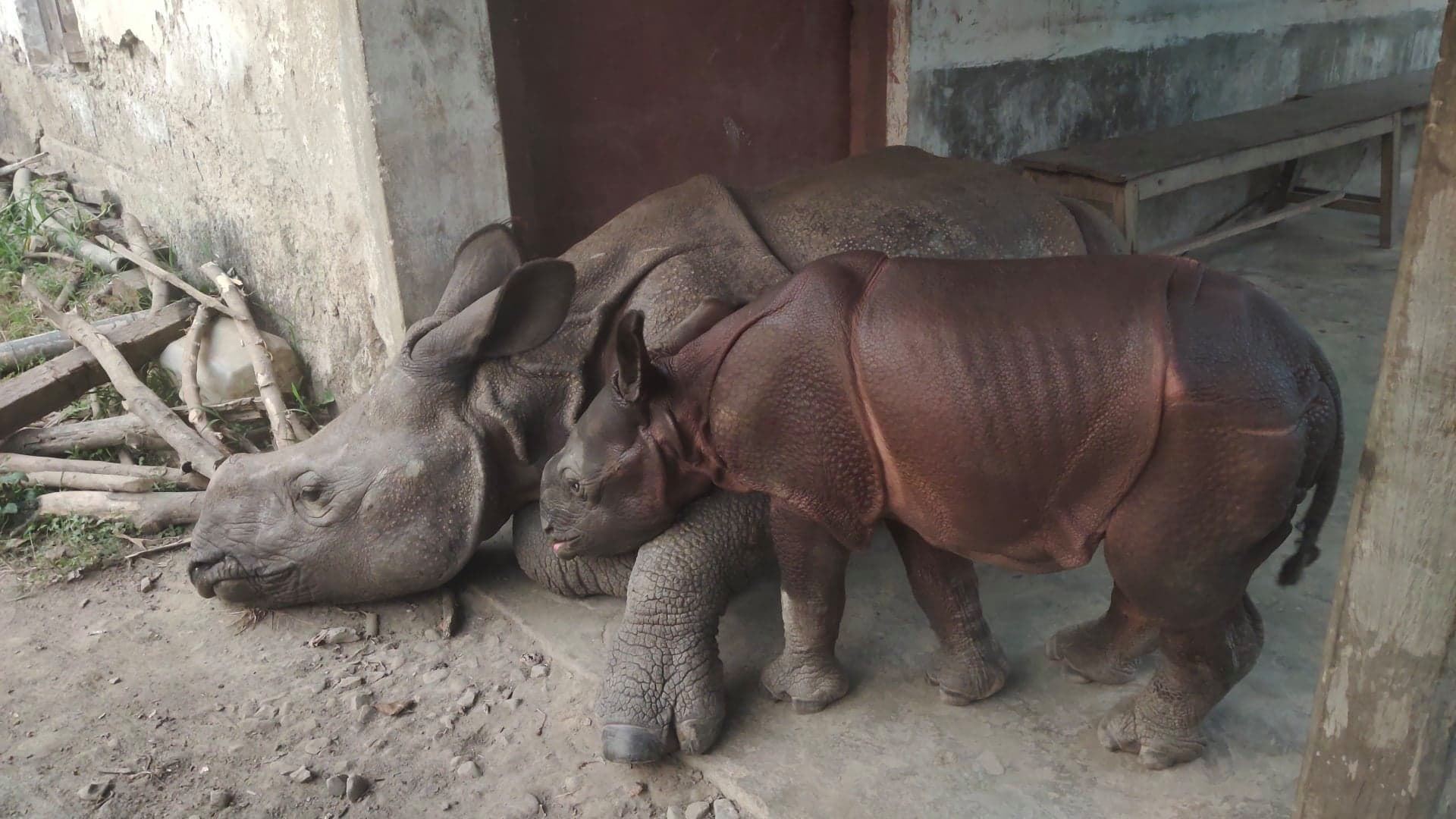NTNC staff raises orphaned baby rhinos

By Basanta Parajuli, Sauraha, Apr. 19: Lal Bahadur Mohadra, an employee of the National Trust for Nature Conservation (NTNC), Sauraha, has a hard time raising unclaimed baby rhinos.
Mohadra, who has been raising Pushpa (a baby rhino) found in Tamaspur in Nawalparasi for the past 15 months, has added responsibility to take care of Anjali, who was found stranded inside the park two weeks ago. Anjali is also a baby rhinoceros.
Mohadra told The Rising Nepal, "I rescued Pushpa, which was found in the wetlands of the park with only her head visible and brought her up. It is easy for me to raise Anjali with the experience I gained while raising Pushpa.”
Anjali was found in the park when it was an 11-day calf. It was handed over to the Nature Conservation Fund after the park staff found it helpless. "We feed lactogen to the orphaned calves until they grow up," said Mohadra. "Even now, we feed Anjali lactogen every two hours."
Unmarried Mohadra has now started thinking that he had two daughters before getting married. "I am the one who has taken care of the calves that have lost their mothers in the forest. Now those calves are like my daughters, “he said.
"There is a difference between the man-raised and nature-raised calves, but raising them and leaving them in the wild later is a challenging task," he said when asked about the behaviours and eating habits of the baby rhinos.
Rhinos are rare wild animals. They are found only in Nepal and India. Their main habitat in Nepal is Chitwan National Park (CNP).
According to the recently concluded rhino census, 694 of the 752 rhinos found in Nepal are from CNP.
Rhinoceros calves are left unattended especially by their mothers or when the mother dies or is killed. Of the 498 rhinos that have died in the last 22 years, 165 have been killed by poachers. If a rhinoceros dies and is killed in this way, its baby will become helpless.
Chief Conservation Officer of CNP Annath Baral said that the calves would become helpless even after their mothers get killed by poachers.
"After the baby is trapped in the wetland, the mother leaves, the male rhinoceros hits the mother and runs away. Even if the mother dies for any reason, the baby is left alone," he said. He added that the rhinoceros calves that were found stranded in this way would be left in the forest and those who were able to fight in the forest on their own would be left as they were.
Statistics of rhinoceros calves are not found anywhere in the forest area. However, one or two such rhinos are rescued annually by the National Park and Nature Conservation Fund.
"In some cases, there are examples of rhinoceros calves being raised and sent abroad as gifts. Some of them have been taken to the zoo,” he said. A rhinoceros, which was raised by the park staff, was sent as a gift to Japan a few years ago.
Head of the National Trust for Nature Conservation, Sauraha, Dr. Baburam Lamichhane said, “Whether it is in a dense forest or a wetland, raising a baby rhino is very difficult. By doing this complex work or taking risk, our staff is working to conserve the rare wildlife.”
Recent News

Do not make expressions casting dout on election: EC
14 Apr, 2022
CM Bhatta says may New Year 2079 BS inspire positive thinking
14 Apr, 2022
Three new cases, 44 recoveries in 24 hours
14 Apr, 2022
689 climbers of 84 teams so far acquire permits for climbing various peaks this spring season
14 Apr, 2022
How the rising cost of living crisis is impacting Nepal
14 Apr, 2022
US military confirms an interstellar meteor collided with Earth
14 Apr, 2022
Valneva Covid vaccine approved for use in UK
14 Apr, 2022
Chair Prachanda highlights need of unity among Maoist, Communist forces
14 Apr, 2022
Ranbir Kapoor and Alia Bhatt: Bollywood toasts star couple on wedding
14 Apr, 2022
President Bhandari confers decorations (Photo Feature)
14 Apr, 2022










